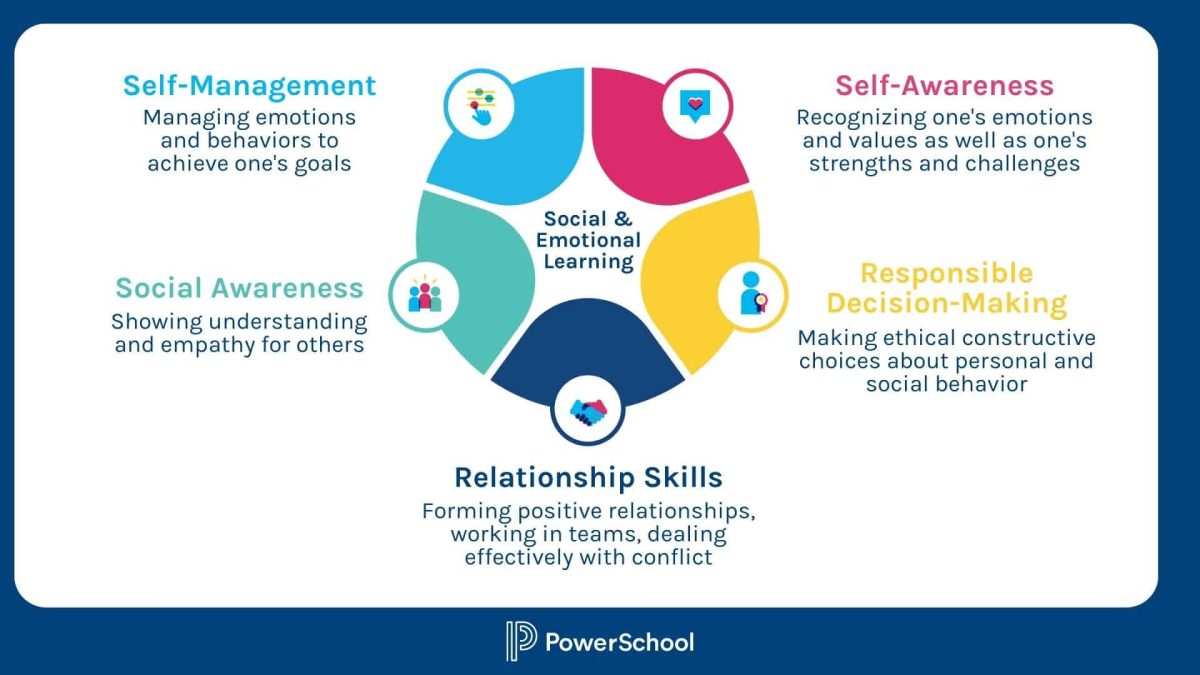In October of this year, a group of middle school students became the very first people to graduate from the brand new cycle, SEL. SEL stands for Social Emotional Learning, and although most subjects are very important, none may be as integral for its students as this one. Rates of mental illness have increased greatly from just twenty years ago, and students need to learn how to manage their emotions, something that many of them struggle with. On principle, SEL should be one of the best classes students take. However, even if the idea is great, the actual execution may falter.
The curriculum of SEL covers the five social competencies: self-awareness, self-management, social awareness, relationship skills, and responsible decision-making. Each of these competencies has its unit, each containing different lessons that relate somewhat to their competency. The first competency, self-awareness, teaches students how to become more aware of their own emotions, with the main lesson being about confidence. This unit is one of the most important ones for students because it allows them to recognize what resources they may need, and seek out those resources. However, it is also one of the shortest units. The longest unit, relationship skills, teaches students how to manage their relationships. Because middle school is generally a time when old friendships are dissolved and new ones are formed, this unit is crucial for allowing students to maintain their relationships. All of this also applies to the unit on social awareness, the second unit.
The unit on self-management may be the most important of all. While any student always has to consider the needs of their other students, they are simply unable to cater to those needs if they do not cater to their own. The unit’s most important lessons are on impulse control, resilience, and emotional regulation, all of which can contribute to the lives of every middle school student. Along these lines is the unit on responsible decision-making, which teaches students about having common sense. Every unit taught in SEL is an everyday skill that students will need to utilize for the rest of their lives, making it one of the most important classes students will take.
On top of being incredibly useful for students, SEL is also not a very difficult subject. There are no tests, and homework is incredibly sparse. Homework typically takes the form of journal entries relating to the lesson, and students are allotted time to complete them during class. The general ease of the class makes it much less stressful for students as they consume the information given. However, that does not mean students will allow all the information to immediately leave their heads, as there is a review unit at the very end of the cycle, virtually guaranteeing that students will remember something. This is an approach that should be considered by the school board at large. While it may be important for some classes to have frequent tests and homework, less stressful classes could help contribute to a better learning environment.
The class of SEL is interactive, important, and simple. It is a great class that should be taught at schools around the nation, which begs the question, why is it not taught around the nation? It could be because of an unfortunate stigma that discredits any conversation about mental health. There is an idea that people who need to talk about emotions are unstable, but everybody needs to talk about their emotions. SEL is not only a great class because of the aforementioned reasons, but it also helps to dispel this myth that plagues so many young Americans.
















